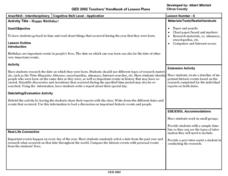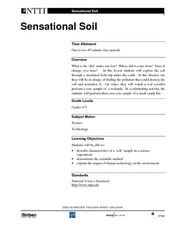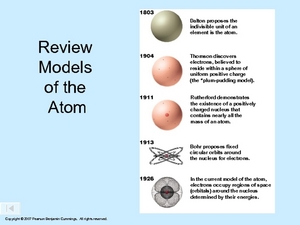Curated OER
Living and Nonliving
Learners use their senses to record and collect data. In How Do I Classify Things in My World?, students practice classifying objects as living or nonliving. In Is it Real Or Pretend?, learners group objects as real or pretend. In What...
Cornell University
Shedding a "Little" Light on Cancer Surgery
Many types of cancer treatments now depend on nanotechnology—a big "little" discovery. Scholars begin by removing "malignant" tissue from simulated brains, one using fluorescent markers thanks to nanotechnology and one without. This...
Curated OER
Summer: Getting the Bugs Out
Students compare and contrast classification systems used throughout the world. They also examine the importance of preserving biological diversity.
Curated OER
Timeline Shuffle
Students examine the role and importance of timelines, and the method for ordering events. They order events and create a timeline of significant technology achievements and scientific discoveries in order from earliest to the most recent.
Curated OER
Lesson Plan: The Cell- A Historical Perspective
Young scholars discover the impact the invention of the microscope had on scientific discovery as well as the concept of spontaneous generation and the cell theory. Students examine these scientific concepts through a WebQuest and by...
Howard Hughes Medical Institute
What van Leeuwenhoek Saw
When van Leeuwenhoek saw cells and single-celled organisms for the first time, he knew these small things were a big deal! Share his discoveries with young learners through a narrated video, model-building activity, and scale study....
Curated OER
Happy Birthday!: Internet Research and Historic Events
Talk about intrinsic motivation! Begin where your learners' natural interests lie -- with themselves -- and launch a variety of projects with this activity. Class members research important events that took place on their...
Curated OER
RISE AND REVIEW
Students work in small groups to brainstorm responses to teacher posed questions as a means of review and present their Interview Projects. They present certain inventions, inventors, and scientific discoveries.
Curated OER
Looking At Science And Technology From a Human Rights Perspective
Students answer discussion questions and analyze technological innovations, scientific discoveries, and environmental crises from a human rights perspective. They research and report back to the class about a related topic.
Curated OER
The Nature of Science
For this nature of science worksheet, students identify four statements as "pure" or "applied" science and they read a short story about an experiment performed by a boy. They identify various components of the experiment...
Curated OER
Diffusion of Molecules
Young scholars conduct a series of experiments to observe factors that impact molecular movement. In this molecular chemistry lesson, students drop food coloring in water with different properties (hot, with ice, with alcohol) and...
Curated OER
The Great Fossil Find - Reconstructing the Pieces
Students go on an imaginary fossil hunt. They follow a script read by the teacher, students "find" (remove from envelope) paper "fossils" of some unknown creature. They attempt to reconstruct fossil pieces into an animal.
Curated OER
Evolution of Observation
Students develop an awareness of the evolution of the scientific method. They facilitate the student's knowledge of looking at variables from different perspectives. Students develop their abilities to defend their ideas with facts or...
Curated OER
Sensational Soil
Fourth and fifth graders explore soil by taking a simulated field trip under the earth. They go to an Internet site that runs a simulation which charges them with finding a source of pollution that could destroy all of Earth's soil, and...
Curated OER
Biotechnology Laboratory Research
Students participate in an extended laboratory research to experience how scientific information is obtained, upon which we build scientific knowledge and understanding.
NASA
Unsung Heroes of Science
Scholars research scientific heroes who haven't been given enough credit for their discoveries. While many are women, there are also men to whom credit is overdue.
NASA
Measuring Dark Energy
You're only 10 minutes late? Do you know how much the universe has expanded in those 10 minutes? Scholars graph supernovae based on their redshift and see if the results verify Hubble's Law. If it does confirm it, the universe is...
Curated OER
Review Models of the Atom
Multiple representations of the varying theories of atomic structure. With these pictures and some background of the theories and scientific figures surrounding them, your class will develop a better understanding of scientific history...
National Academy of Sciences
Genetic Disease: Putting DNA to Work
Scientific knowledge of genetic information has grown quickly over the last decade. An interactive lesson has learners research the role of science and medicine in diagnosing and treating genetic disorders. They consider the job of the...
Discovery Education
Jets in Flight
This Discovery Education activity provides the information needed to understand the basics of flight. Before taking off, young pilots learn the eight stages of the engineering design process. Small groups then design and build...
American Museum of Natural History
Keeping a Field Journal
Recording scientific evidence allows for important discoveries and conclusions. A remote learning resource outlines how to create a field journal to record scientific observations. The outline resource includes notation about the...
Discovery Education
Fuss About Dust
Dust is everywhere around us; it's unavoidable. But what exactly is dust and are certain locations dustier than others? These are the questions students try to answer in an interesting scientific investigation. Working independently or...
Curated OER
From Gene to Protein
Here is a detailed presentation to assist in your lectures on the difficult topic of genetic transcription. The history, discovery, and scientific breakthroughs will spark interest. The last 15 slides deal with the biochemistry and...
National Center for Case Study Teaching in Science
A Strange Fish Indeed
Communication is one of the most important aspects of science. In a two-day activity, your high school or college-level biologists will read excerpts from a fictional diary of Marjorie Courtenay-Latimer, the woman who discovered the...























